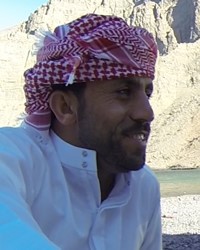Kumzari in Oman

Photo Source:
Anonymous
|
Send Joshua Project a map of this people group.
|
| People Name: | Kumzari |
| Country: | Oman |
| 10/40 Window: | Yes |
| Population: | 6,000 |
| World Population: | 6,700 |
| Primary Language: | Kumzari |
| Primary Religion: | Islam |
| Christian Adherents: | 0.00 % |
| Evangelicals: | 0.00 % |
| Scripture: | Translation Needed |
| Ministry Resources: | No |
| Jesus Film: | No |
| Audio Recordings: | No |
| People Cluster: | Luri-Bakhtiari |
| Affinity Bloc: | Persian-Median |
| Progress Level: |
|
Introduction / History
The Kumzari are located in northern Oman at the northernmost part of the Musandam Peninsula. They live primarily in the seacoast town of Kumzar and also in Khasab and Diba. The Musandam Peninsula is a landmark for navigators, with its high mountains plunging down to the sea. Overlooking the Strait of Hormuz, the rugged land makes it difficult to access the mountain villages and coastal cities. Due to their location, the Kumzari remain isolated.
The Kumzari speak a language that is related to Persian but has some Arabic aspects. They also use a form of Omani Arabic to communicate with other tribes and with the government.
What Are Their Lives Like?
They carry unique, long-handled axes with small ax heads, while other Omani men wear daggers in their belts. They also use a type of fishing boat found nowhere else in Oman.
The Kumzari are primarily fishermen, although some also herd sheep and goats and grow date palms during the summer. Others work as sailors, boat builders, merchants or craftsmen. A few men have also gone to work in the oil fields of Oman or the United Arab Emirates. They are diverse in their careers and some work as doctors, nurses, business men and women, students, poets, writers, engineers and teachers.
The main diet of the Kumzari consists of goat milk, cheese, goat meat, mutton and fish. They regularly have figs, coffee and canned foods. At mealtime, they put mats on the ground, and the food is placed on the mats. Men and women sit in separate circles with other family members, sharing food from a tray on the mat.
Kumzari men construct the homes, conduct the agricultural activities, fish, collect honey, and shear, slaughter and skin the animals. The women process agricultural products, feed and milk the animals, make butter and cheese, and engage in all the domestic duties, such as carrying water, cooking and sewing.
Kumzari houses are built extremely close together. In fact, the only gap among the crowded houses is a narrow drainage channel for the village. Houses are made from stone and have tiny courtyards and flat stone roofs. The entire village is surrounded by tall mountains on all sides except one. This open side gives the people access to water and is where most of the daily activities occur. There is no room inside the village interior for such activities, since it is completely compacted with homes. During summer, many Kumzari move to Khasab and Diba, where houses are larger and more dispersed. There, they work on their date palm plantations.
Among the crafts produced by the Kumzari are braided articles from the date palm. These include such items as brushes made from the ribs and leaves, fans for cooling people, mats on which to dry fish and dates, pottery, clay coffee pots and the jerez. The jerez may be used as a walking stick in the rugged terrain or as a means of defense from wildcats. Other times it is used to hold sacks slung over the shoulder or as an ornamental accessory brought to important tribal community functions.
What Are Their Beliefs?
The Kumzari are entirely Muslim, following the teachings of the Koran. Like some other Muslim peoples around the world, they have their own type of folk Islam, which combines Islam with their pre-Islamic practices. They believe in evil spirits, which are warded off by cowrie shells tied to the bows of their boats. They believe in a she-devil who casts shadows and walks around in rags, carrying a basket. They believe she causes miscarriages in pregnant women. They also believe in monstrous creatures of various kinds.
What Are Their Needs?
The Kumzari have no Christian resources available to them, and no mission agency is currently working among them. Because of the remoteness of their location (which can only be reached by boat or plane), the great majority of the Kumzari have not had a chance to hear the gospel.
Prayer Points
Pray that strong multiplying fellowships that among the Kumzari.
Ask the Holy Spirit to guide Christians so that they will come into contact with the Kumzari.
Pray that Jesus will supernaturally reveal himself as Lord to the Kumzari.
Ask the Lord to save key leaders among the Kumzari who will boldly declare the gospel to their own people.